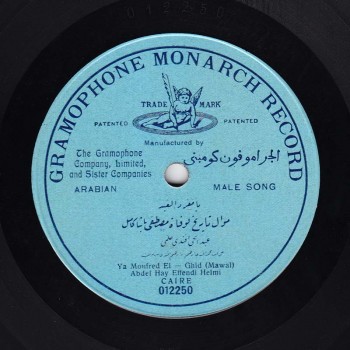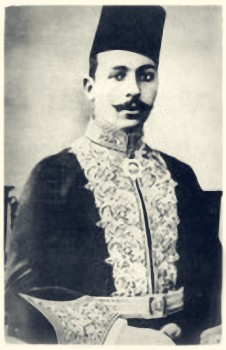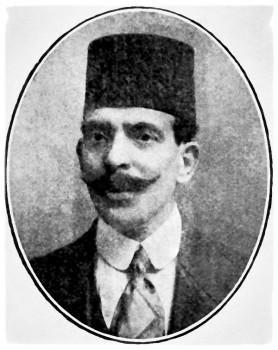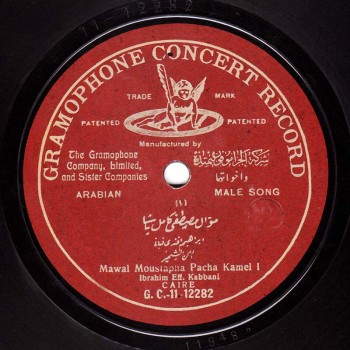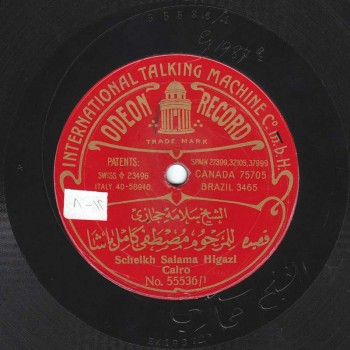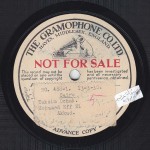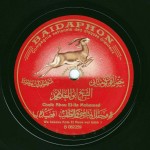An Egyptian nationalist leader, known for his resistance against the British occupation at the beginning of the 20th century.
He was the first leader ever to be mentioned by name –not only alluded to– in an Arabic song.
Muṣṭafa Kāmil was born on August 14th 1874 in Kattāmah (or Ketama) village under the jurisdiction of Basyūn al-Gharbiyya (Western Basyūn). He graduated in 1890 from the Khedivial School with a baccalaureate (High School degree) and in 1891 from the Law School in Cairo. He then traveled to France where he completed his Law studies and lived for several years.
Muṣṭafa Kāmil’s first book “Al-mas’ala al-sharqiyya” (The Oriental Question) published in 1898 is a key reference work on the political situation in the East from the end of the 19th century to our day.
He founded the “Al-liwā’ ” (The Standard) daily in 1900 then started the National Party following the Dinshaway incident in 1906. Note that this National Party is not related in any way to the National Party ruling Egypt before the revolution of January 25th 2011.
Muṣṭafa Kāmil was one of the founders of “the Egyptian University” that he wanted to name “the Islamic University”.
He saw the Ottoman Empire as a continuation to the Caliphate system, and believed its presence as an authority to be better than the foreign occupation in Egypt.
The resistance movement he started subsequently to the Dinshaway incident led to Lord Cromer’s fall in 1907.
His was on good terms with Khedive ‘Abbās.
Muṣṭafa Kāmil died on February 10th 1908. He was elegized by poets and by singers.
Let us now listen to the most famous lamentation written to elegize Muṣṭafa Kāmil: the qaṣīda written by Aḥmad Shawqī Bey –the court poet at that time– and sung by Sheikh Salāma Ḥigāzī. It was recorded in 1908 by German record company Odeon on 4 record sides (i.e. 2 records), # 55536 / 1, 2, 3 and 4, matrix # EX 1987 / A, B, C and D.
This qaṣīda is the only recording available of Sheikh Salāma Ḥigāzī singing a capella without even a biṭāna. He sings it solo as if lamenting over the nation’s loss of this young man.
This qaṣīda mursala (of non-metric measure) is performed to the sīkāh maqām.
Here are some of Muṣṭafa Bāshā’s most famous quotes:
“If I weren’t an Egyptian, I would have wished to be an Egyptian”
“Hope is the key to life and the path to freedom”
“Despair is pointless in life. And despair renders life meaningless”
“A motherland that does not get its nourishment from the seeds it plants and that wears clothes made by others is sentenced to subjection and annihilation. And one who scorns any of the rights of his religion or his motherland, even only once, will forever remain with a shaky ideology and ailing strength.
Let us now listen to mawwāl “Yā mufrad al-ghīd” that seems to have been recorded by ‘Abd al-Ḥayy Afandī Ḥilmī at the time of Muṣṭafa Kāmil Bāshā’s death, since he mentioned the date of his death and prayed God to have mercy upon his soul.
The mawwāl was recorded in 1908 by Gramophone on 1 record side (i.e. half a disc), # 012250, matrix # 37P, ḥijāz maqām, with the takht of Ibrāhīm Afandī Sahlūn, Muḥammad Afandī Ibrāhīm and ‘Alī Afandī ‘Abduh Ṣāliḥ.
Muṣṭafa Kāmil Bāshā was the first to associate teaching and education, saying that teaching without education was pointless. He called for establishing educational institutions, as well as for equal rights to education for the poor and the rich, defining education as a patriotic duty.
Let us listen to mawwāl “Muṣṭafa Kāmil” sung by Ibrāhīm Al-Qabbānī. It was recorded in 1908 by Gramophone on 2 record sides, # G.C.11-12282 and G.C.11-12283, matrix # 11948b and 11949b, rāst maqām, with the takht of Ibrāhīm Afandī Al-Qabbānī, Muḥammad Afandī Ibrāhīm and Sāmī Afandī Al-Shawwā.
Finally, let us listen to dawr “Muṣṭafa Kāmil” written by Ismā‘īl Bāshā Ṣabrī and composed and sung by Ibrāhīm Afandī Al-Qabbānī. It was recorded in 1908 by Gramophone on 2 record sides, # G.C.10-12039, G.C.10-12040, matrix # 11950b and 11951b –this record is filed right after the record of the previous mawwāl–, sīkāh maqām, performed with the same takht.
Thank you for listening.
We will meet again in a new episode to discuss a historical event or another historical figure.
- 221 – Zakariyya Ahmed – 12 (1/9/2022)
- 220 – Zakariyya Ahmed – 11 (1/9/2022)
- 219 – Zakariyya Ahmed – 10 (11/25/2021)
- 218 – Zakariyya Ahmed – 9 (10/26/2021)
- 217 – Zakariyya Ahmed – 8 (9/24/2021)
- 216 – Zakariyya Ahmed – 7 (9/4/2021)
- 215 – Zakariyya Ahmed – 6 (8/28/2021)
- 214 – Zakariyya Ahmed – 5 (8/6/2021)
- 213 – Zakariyya Ahmed – 4 (6/26/2021)
- 212 – Zakariyya Ahmed – 3 (5/27/2021)
- 211 – Zakariyya Ahmed – 2 (5/1/2021)
- 210 – Zakariyya Ahmed – 1 (4/28/2021)
- 209 – W-al-Lāhi lā astaṭī‘u ṣaddak 2 (4/6/2017)
- 208 – W-al-Lāhi lā astaṭī‘u ṣaddak 1 (3/30/2017)
- 207 – Bashraf qarah baṭāq 7 (3/23/2017)

